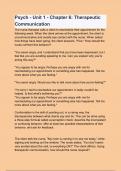Exam (elaborations)
Psych - Unit 1 - Chapter 6 Therapeutic Communication Questions with 100% Actual correct answers | verified | latest update | Graded A+ | Already Passed | Complete Solution
- Course
- Institution
Psych - Unit 1 - Chapter 6 Therapeutic Communication Questions with 100% Actual correct answers | verified | latest update | Graded A+ | Already Passed | Complete Solution
[Show more]



